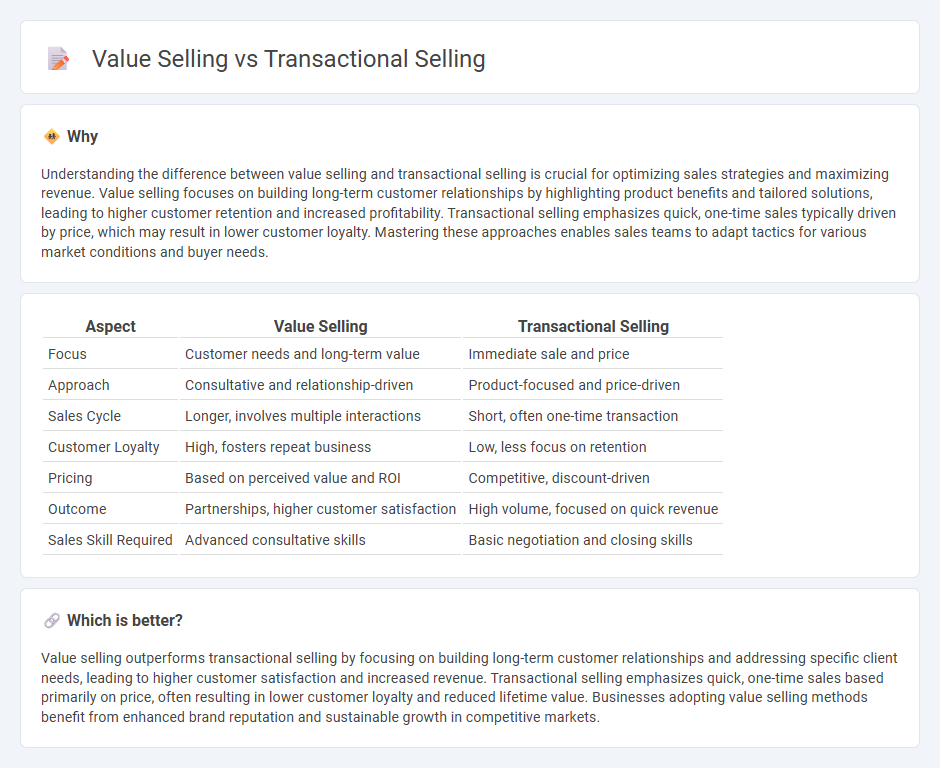
Value selling focuses on understanding and addressing a customer's specific needs by emphasizing the long-term benefits and return on investment of a product or service. Transactional selling prioritizes quick sales with minimal engagement, often hinging on price or convenience rather than lasting value. Explore how these approaches impact your sales strategy and overall customer relationships.
Why it is important
Understanding the difference between value selling and transactional selling is crucial for optimizing sales strategies and maximizing revenue. Value selling focuses on building long-term customer relationships by highlighting product benefits and tailored solutions, leading to higher customer retention and increased profitability. Transactional selling emphasizes quick, one-time sales typically driven by price, which may result in lower customer loyalty. Mastering these approaches enables sales teams to adapt tactics for various market conditions and buyer needs.
Comparison Table
| Aspect | Value Selling | Transactional Selling |
|---|---|---|
| Focus | Customer needs and long-term value | Immediate sale and price |
| Approach | Consultative and relationship-driven | Product-focused and price-driven |
| Sales Cycle | Longer, involves multiple interactions | Short, often one-time transaction |
| Customer Loyalty | High, fosters repeat business | Low, less focus on retention |
| Pricing | Based on perceived value and ROI | Competitive, discount-driven |
| Outcome | Partnerships, higher customer satisfaction | High volume, focused on quick revenue |
| Sales Skill Required | Advanced consultative skills | Basic negotiation and closing skills |
Which is better?
Value selling outperforms transactional selling by focusing on building long-term customer relationships and addressing specific client needs, leading to higher customer satisfaction and increased revenue. Transactional selling emphasizes quick, one-time sales based primarily on price, often resulting in lower customer loyalty and reduced lifetime value. Businesses adopting value selling methods benefit from enhanced brand reputation and sustainable growth in competitive markets.
Connection
Value selling focuses on addressing customer needs by highlighting product benefits and long-term value, while transactional selling emphasizes quick, price-driven exchanges. Both approaches aim to close sales but differ in strategy and customer engagement depth. Integrating value selling into transactional methods can enhance customer satisfaction and drive repeat business.
Key Terms
Price
Transactional selling centers primarily on price, emphasizing quick, one-time exchanges with minimal customer engagement or customization. Value selling prioritizes understanding customer needs and demonstrating the product's unique benefits, often justifying higher prices through added value and long-term relationships. Explore the differences further to optimize your sales strategy effectively.
Relationship
Transactional selling prioritizes quick exchanges with minimal focus on customer relationships, aiming for immediate sales volume. Value selling emphasizes building long-term customer relationships by understanding client needs and delivering tailored solutions that enhance perceived value. Explore how cultivating strong relationships in value selling drives sustained business growth.
Solution
Transactional selling centers on fast, price-driven exchanges prioritizing individual product features, while value selling emphasizes understanding customer needs to provide tailored solutions that deliver long-term benefits. Solution-focused value selling builds stronger client relationships by addressing specific pain points and demonstrating measurable ROI. Explore more about how value selling transforms customer interactions and drives business growth.
Source and External Links
What is transactional selling, and how does this approach work? - Transactional selling is a negotiation strategy focused on making quick, one-off sales, emphasizing competitive pricing, urgency, and social proof rather than building long-term customer relationships.
Transactional selling: Strategy, definition and how it works - Transactional selling aims to drive immediate revenue by closing as many one-time deals as possible, using minimal personalization and relying on scarcity and promotional offers to prompt quick purchases.
The One-Call Close: A guide to transactional sales - This approach prioritizes speed and efficiency, closing deals quickly with minimal touchpoints, making it ideal for high-volume, straightforward products or services that don't require extensive customer education or relationship-building.
 dowidth.com
dowidth.com